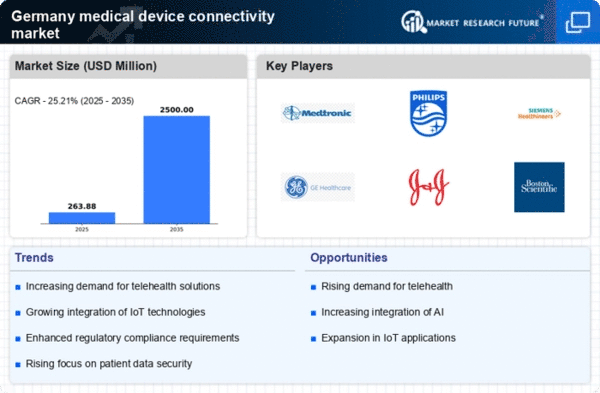Rising Incidence of Chronic Diseases
The prevalence of chronic diseases in Germany is on the rise, which is driving the demand for connected medical devices. Conditions such as diabetes, cardiovascular diseases, and respiratory disorders require continuous monitoring and management, leading to an increased reliance on medical devices that offer connectivity features. Data indicates that approximately 30% of the German population is affected by chronic diseases, necessitating innovative solutions for effective management. This trend is likely to propel the medical device-connectivity market, as healthcare providers seek to implement technologies that enable remote monitoring and data sharing, ultimately improving patient outcomes.
Growing Demand for Telehealth Services
The medical device-connectivity market in Germany is experiencing a surge in demand for telehealth services. This trend is driven by the increasing acceptance of remote consultations and monitoring, which allows healthcare providers to deliver care more efficiently. According to recent data, the telehealth market in Germany is projected to grow at a CAGR of approximately 25% over the next five years. This growth is likely to enhance the integration of connected medical devices, facilitating real-time data exchange between patients and healthcare professionals. As a result, the medical device-connectivity market is expected to expand significantly, with investments in technologies that support telehealth solutions becoming increasingly prioritized.
Increased Investment in Health IT Infrastructure
Investment in health IT infrastructure is a critical driver for the medical device-connectivity market in Germany. The government and private sector are allocating substantial resources to enhance digital health capabilities, which includes the integration of connected medical devices into existing healthcare systems. Recent reports suggest that investments in health IT are expected to reach €5 billion by 2026, reflecting a strong commitment to improving healthcare delivery. This influx of capital is likely to support the development of interoperable systems that facilitate seamless data exchange among medical devices, ultimately benefiting the medical device-connectivity market.
Regulatory Support for Digital Health Innovations
Regulatory frameworks in Germany are evolving to support innovations in digital health, which is positively impacting the medical device-connectivity market. The German Federal Ministry of Health has introduced initiatives aimed at promoting the use of connected medical devices, ensuring they meet safety and efficacy standards. This regulatory support is likely to encourage manufacturers to invest in developing advanced connectivity solutions. Furthermore, the Digital Healthcare Act (DVG) incentivizes the integration of digital health applications into standard care, potentially increasing the adoption of connected devices. As a result, the medical device-connectivity market is expected to benefit from a more favorable regulatory environment, fostering innovation and growth.
Advancements in Wireless Communication Technologies
Technological advancements in wireless communication are significantly influencing the medical device-connectivity market in Germany. The proliferation of 5G technology is expected to enhance the performance of connected medical devices, allowing for faster data transmission and improved reliability. This advancement may facilitate the development of more sophisticated medical applications, such as real-time monitoring and telemedicine solutions. As healthcare providers increasingly adopt these technologies, the medical device-connectivity market is likely to witness substantial growth. The integration of advanced wireless communication systems could lead to enhanced patient care and operational efficiencies within healthcare settings.
















